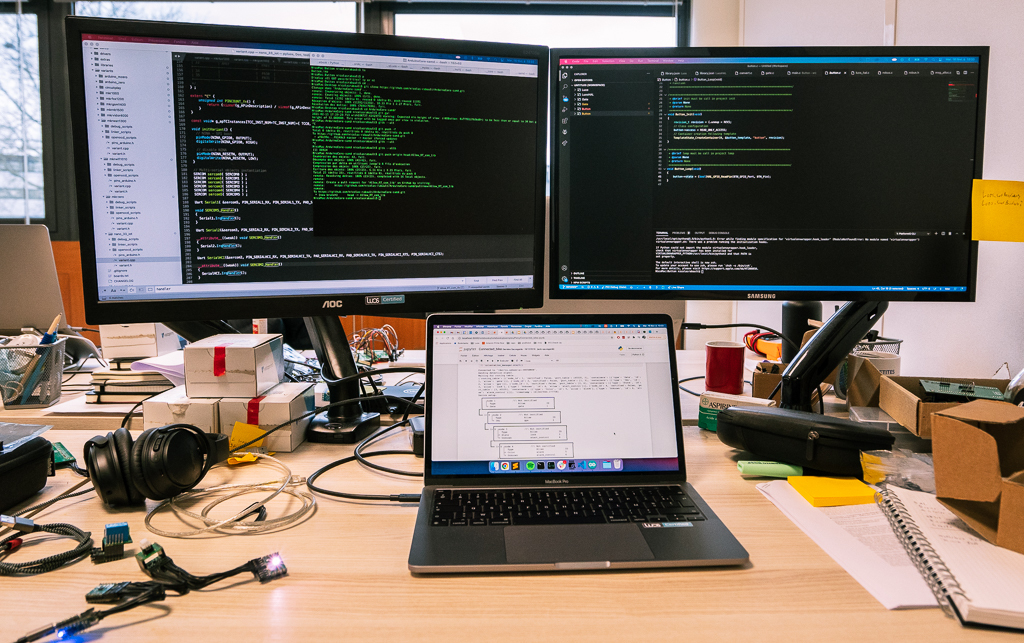Luos, a participant in the TechCrunch Disrupt Startup Battlefield competition this week, wants to make it easy for embedded hardware developers to connect to any hardware component, such as a motor or sensor, then build a reusable configuration profile to give them the same type of flexibility that software engineers have with microservices.
Luos CEO and co-founder Nicolas Rabault says that as a former embedded hardware engineer, he wanted to build a solution that would simplify the way these engineers have historically worked. “The idea of Luos is to allow embedded system developers to create things that could be easily reusable by others, and a way to just compose with existing [profiles], instead of remaking everything every time,” Rabault told me.
He said the inspiration for this approach came from the world of microservices. “We based our technology on microservices in the web world because microservices allow web developers to create reusable bits of software that can be used by anyone, anywhere in the world,” he said.
As he describes it, “Luos exposes a standard API for any part (buttons, motors, batteries, cameras, WiFi, etc.) allowing anyone to use all those services without any additional development and then you can create portable and reusable behavior code [we call a profile].” So you might have a battery profile or a motor profile that you can apply to every type of battery or motor regardless of which company produced it.
To put this capability in reach of any embedded hardware engineer, the company has developed an open source library that enables developers to create these different generic profiles. To get things started, the startup seeded it with some common ones like motors, but an embedded developer can download the open source framework and create one anytime, and then share it with the community.
Prior to creating this framework, engineers would typically create custom code for each component on a board, a time-consuming and frustrating process. The Luos solution removes much of that complexity and provides a common way to connect to different parts on the board by creating these common profiles.
While there isn’t a marketplace or central library for sharing profiles quite yet, the plan is to create one where there will be an organized way to share them. Today, the company makes money by working with organizations in a consulting or support role to help them use the development library or build profiles via a subscription model.
https://www.youtube.com/watch?v=7o9Y41LN1l4
Luos is also working on a SaaS tool to help the embedded engineers troubleshoot problems on shipped boards, allowing them to remotely figure out what happened to a particular component like a motor and send a fix. This will add to the revenue base when it’s completed.
Rabault and his co-founders launched the startup in 2018, but the roots of the idea go back 14 years when Rabault was still a student. He says he has spent his entire career working directly or indirectly on these issues, and when he started this company, the technology had matured enough to implement a solution like this.
The company today has 12 employees, including the three founders and has plans to hire more, especially around community management, an important role in a company like this, along with user experience people and more embedded system engineers. He wants to build a diverse company, and while they only have employees living in France at the moment, they are a remote company and open to hiring from anywhere, which could help drive diversity as they continue to build the company.
So far the startup, which is based in Bordeaux, France, has raised $1.4 million in seed money. The primary goal for this initial investment is to help spread the word about what the startup is doing among its target audience of embedded system engineers.
Certainly participating in Battlefield will help amplify their mission, but the founders have also gotten practical advice on how to frame and pitch the company to users, customers and investors, and to introduce themselves to a U.S. audience, where Rabault believes that engineers are more open to experimenting with new tools like the ones from his company than they are in Europe where he is based. He sees Battlefield as a key way to reach that audience.
































Comment